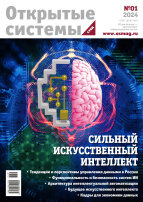_300x.jpg)
INTERNET OF THE FUTURE
Security and Privacy Challenges in Information-Centric Wireless Internet of Things Networks
The information-centric networking model uses content as the fundamental element, which can be cached and redistributed within the network. In a large-scale, wireless Internet of Things network, this improves efficiency significantly, but also renders many host-centric security solutions obsolete. This article discusses security and privacy challenges in a merged paradigm.
Boubakr Nour (n.boubakr@bit.edu.cn), Ph.D. student, Kashif Sharif (kashif@bit.edu.cn), associate research professor, Fan Li (fli@bit.edu.cn) professor, Beijing Institute of Technology; Yu Wang (wangyu@ieee.org), member, IEEE.
PLATFORMS
The Rise of Import Substitution
Today, there is plenty of IT security solutions both from Russian and global vendors, although only the ones certified by Russian regulatory bodies are allowed for use in governmental IT systems. With products offered by overseas security vendors still present among the certified ones, Russia needs off-the-shelf security systems built exclusively upon a domestic platform.
Andrei Pyanchenko (a.pyanchenko@voskhod.ru), R&D Department Manager, Igor Chizhevsky (i.chizhevskiy@voskhod.ru), Deputy Head, Department for State Information Systems Building, Mariya Vdovina (m.vdovina@voskhod.ru), Systems Architect, IT Security Systems R&D Department, Voskhod (Moscow).
An RPA Platform for Oil and Gas Fields
Robotic process automation will enable the petroleum industry to minimize worker risks, accelerate decision-making process, shorten operation times, and improve field mining efficiency.
Sergei Kosenkov (kosenkov@nposngs.ru), IT Projects Leader, Soyuzneftegazservis, Vladislav Balashov (vladislav.balashov@gmail.com), Research Fellow, M. V. Keldysh Institute of Applied Mathematics (Moscow).
MACHINE LEARNING
Knowledge Graph Semantic Enhancement of Input Data for Improving AI
Intelligent systems designed using machine learning algorithms require a large number of labeled data. Background knowledge provides complementary, real-world factual information that can augment the limited labeled data to train a machine learning algorithm. The term Knowledge Graph (KG) is in vogue as for many practical applications, it is convenient and useful to organize this background knowledge in the form of a graph. Recent academic research and implemented industrial intelligent systems have shown promising performance for machine learning algorithms that combine training data with a knowledge graph. In this article, we discuss the use of relevant KGs to enhance the input data for two applications that use machine learning — recommendation and community detection. The KG improves both accuracy and explainability.
Shreyash Bhatt (bhattshr@amazon.com), Jinjin Zhao (jinzhao@amazon.com), machine learning scientists, Amazon.com; Amit Sheth (amit@sc.edu), fellow, IEEE; Valerie Shalin (valerie.shalin@wright.edu), professor, Wright State University.
Attacking Machine Learning Systems
The field of machine learning security is progressing rapidly, and new risks have been detected. Machine learning technologies and solutions are expected to become prominent features in the information security landscape.
Bruce Schneier (www.schneier.com), chief of security architecture, Inrupt.
DATA ACADEMY
Visiology Analytics Platform
BI systems are an integral part of today's corporate infrastructure, yet their operational efficiency depends upon the extent to which they align with company's business objectives. The architecture of Visiology analytics platform was created from the ground up with the aim to manage business of large enterprises.
Ivan Vakhmianin (ivan@visiology.com), CEO, Visiology (Moscow).
Software Engineering for Data Analytics
We are at an inflection point where software engineering meets the data-centric world of big data, machine learning, and artificial intelligence. The article summarizes findings from studies of professional data scientists and discusses perspectives on open research problems to improve data-centric software development.
Miryung Kim (miryung@cs.ucla.edu), professor, University of California, Los Angeles
OPINION
Does the “Sky” Clear Up?
Despite cloud computing being actively touted, companies, having faced a number of challenges, are bringing their applications back to corporate datacenters. However, business applications could still get back into the cloud, when there would be the ability to do that fast and simple.
Igor Korneto (igor.kornetov@nutanix.com), CTO, Nutanix Russia & CIS (Moscow).
How to become a data-driven company?
Data is not an end in itself, but rather a guide for action. Companies that have been able to bring value using just numbers deserve the right to be called data-driven. However, the way to achieve that status is by no means a simple venture, as the experience of Uralsib bank has shown.
Yuri Sirota (SirotaYN@uralsib.ru), Senior Vice President, Head of AI and Analytics Office, Head of BI Excelence Center; Andrei Shishov (ShishovAE@uralsib.ru), Data Scientist, AI and Data Analytics Office, Uralsib (Moscow).
OS ACADEMY
Big Data Management in Research Infrastructures
The lack of a standard format for scientific big data representation prevents getting full value from investment into research-oriented IT infrastructures. Implementing the FAIR Data Principles that enable managing data without user intervention is one of the first steps to creating digital infrastructure for transferring scientific results and monitoring the growth of research data.
Artiom Baliakin (Balyakin_AA@nrcki.ru), Head of Multilateral Research and Technology Cooperation Department, Andrei Malishev (Malyshev_AS@nrcki.ru), Lead Research Scientist, Kurchatov Institute (Moscow).
Document Automation: From Content to Knowledge
Amid the pandemic with no end in sight, the experience of moving education online could become the subject of keen attention with a view to modernize the entire education system in a way that enables maximum comfortable learning. Of course, that would be possible only if students are self-disciplined and have motivation to learn, with both of the qualities, according to a Coursera report, being especially characteristic of Russian students.
Alexander Serikov (aserikov@intuit.ru), vice dean, National Open University INTUIT; Dmitry Volkov (vlk@keldysh.ru), Senior Research Fellow, Keldysh Institute of Applied Mathematics (Moscow).
LIBRARY
Towards Human-Machine Cooperation without Cyberpandemics
The June, July, and August issues of Computer Magazine (IEEE Computer Society, Vol.53, No. 6–8, 2020) cover the subjects of cyberpandemics, commercial uses of blockchain technology, and hybrid human/artificial intelligence.
Alexander Tyrenko (shoorah@osp.ru), reviewer, Computerworld Russia (Moscow).
